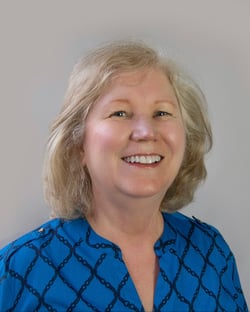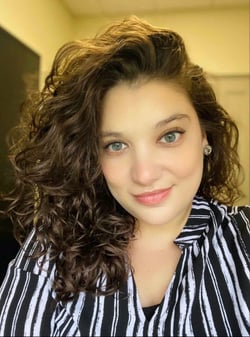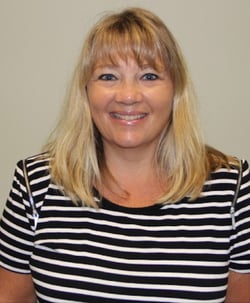Nurses are often required to be an incredible combination of medical professional, project manager and caretaker, and our nurses here at the Memory and Aging Program (MAP) rise to the challenge and then some.
Their knowledge, skill and compassion help to bring all the various aspects of medical research and clinical care together in a way that both provides the best in care for individual patients while also serving the needs of the greater good by supporting the development of better treatments for future patients to come.
Here, three MAP nurses share what drives the work they do every day, their wishes for the patients of today and their hopes for the fight against Alzheimer’s in the future.
 Cheryl Kechichian, RN | Nurse Coordinator
Cheryl Kechichian, RN | Nurse CoordinatorCheryl has worked as a registered nurse in a variety of settings including hospitals, community centers, home care, and long term care. Eventually she decided that working with adults and elders with memory issues was her calling, and she joined the Memory and Aging program in 2007.
“I started my medical career as a certified nursing assistant when I was 16. I really loved working with the elderly and had always wanted to work in an environment where I could make a difference and enhance the quality of life for them. I was also close to my grandparents, who both developed different forms of memory loss, and that cemented my desire to work in research for memory loss.
I’ve worked in a variety of settings throughout my career, including hospitals, nursing homes, home care and community clinics. I also attended Northeastern University towards a degree in Information Sciences, and after that I worked in the health insurance industry, with software development, testing and design. But eventually I began to miss working with the elderly and found myself seeking an opportunity to work in this field again. I found it here at the Memory and Aging Program.
My favorite part of this job is the contact I have with patients. I enjoy talking to and supporting them in any way I can. The patients and their families can be very inspiring on many levels. They all have interesting life experiences and family histories that are very intriguing.
I do wish that more people understood the vast amount of work and time that goes into research and getting FDA approval for any drug. It can take many painstaking years and there are so many steps required. Due to the mounting regulatory and paperwork associated with research, some days can be overwhelming with paperwork, but it’s a very important and necessary part of working in this field.
The most rewarding times are the moments when I can make a patient smile and know that they are comfortable and feeling cared for.
 Vanessa Rua, RN, BSN | Nurse Coordinator
Vanessa Rua, RN, BSN | Nurse CoordinatorVanessa graduated with a Bachelor of Science in Nursing and a Bachelor of Arts in Psychology from Rhode Island College. She began her career as a registered nurse in the acute medical-psychiatric unit at Rhode Island Hospital, but says she’d always been interested in research and learning about new technologies, therapies, and medications. That interest led her to join the Memory and Aging Program team in 2017.
“I wanted to find a nursing opportunity that would place me on the forefront of providing cutting-edge care through research.
Here at the Memory and Aging Program, my day-to-day work can include everything from working closely with patients to ensure that the study protocol is being followed, to conducting medical history reviews and clinical intakes, coordinating study visits and multiple sub-studies, administering IV, medication reconciliation, data management, adverse event reporting, and performing psychometric testing.
Ultimately, a research nurse has to be whatever the person in front of them needs the nurse to be; whether it’s shifting from clinical care, to being an educator, to serving as an advocate for patients, or acting as a liaison within an interdisciplinary team. The complexities of research nursing are what make the role both challenging and rewarding.
This role has allowed me the opportunity to forge great relationships with patients and caregivers while continuing to provide meticulous care and support throughout their healthcare journey here at MAP.
One particularly memorable experience was being able to present the Memory and Aging Program Citizen Scientist Award certificate to one of my research patients, the first participant in the world to complete the A4 clinical trial.
Participating in clinical trials is a great way to make the choice to exert power over the disease, embrace hope for the future, and help find treatments and cures. But I do also wish that more people, especially caregivers, would contact their Alzheimer’s Association chapter to learn more about all the wonderful resources available to them.
For me, the most rewarding part of my job is just having the privilege to be a part of someone’s story. To truly say I’ve made a difference in someone’s life is the ultimate reward.”
 Lisa Williams, BSN | Nurse Coordinator, Infusion Specialist
Lisa Williams, BSN | Nurse Coordinator, Infusion SpecialistLisa has over 28 years of nursing experience in the areas of oncology, infusion therapies, and home care. She specialized in home infusion therapies, with more than 25 years’ experience in IV insertion and medication administration.
“Before joining the Memory and Aging Program in 2017, I had worked for 20 years or so in nursing management, specializing in home IV therapy.
That role didn’t have much patient interaction, but there was a situation where I had to make some home care visits and I realized I missed actually ‘being a nurse.’ The opportunity at MAP allowed me to use my 25-plus years of experience in IV therapy, and I was also excited to learn and be involved more in the Alzheimer’s research process.
As a clinician of 34 years, I’ve observed and empathize with the devastating effects Alzheimer’s disease can have on patients, caregivers and families.
In my role at MAP, I typically start my day early ordering the IV investigational research medications and preparing and organizing the infusion suite for participants. I complete the required documentation for each research trial, administer the IV medications per protocol, and monitor vital signs, the tolerance of the monoclonal antibody and manage the infusion room schedule.
While the patients are receiving treatment, we do a lot of chatting and laughing about current events, weather, entertainment, sports, and family events. I feel so fortunate to be able to spend a significant amount of time talking and developing trusting relationships with study participants and caregivers during their infusions.
I’m able to really get to know them, hear them talk about their children and grandchildren, their vacations and holidays, their life experiences and past work and passions. Nurses don’t often have enough time to communicate with patients, but most of the infusions are at least an hour so I have a captive audience! I absolutely love coming to work every day, and I try to make their experience here enjoyable and fulfilling.
I wish people realized how overwhelming Alzheimer’s disease is for patients and caregivers. I don’t think people really understand how the lack of control, feelings of helplessness and isolation can affect both of them. I feel while we are working towards a treatment, there needs to be more state and federal community resources available.
For me, the most rewarding part of what I do is being part of the research process, seeing the hope the participants have, and knowing I may be part of finding the treatment or better yet cure that is so needed to help fight this disease. I was able to infuse the world’s first dose of Aduhelm outside of a clinical trial last June and being part of that moment was an emotional experience, knowing we were one step closer to a potential treatment for Alzheimer’s.
Copyright © 2023 Care New England Health System